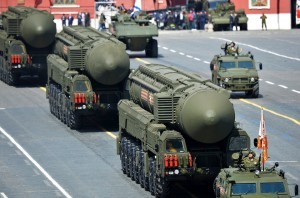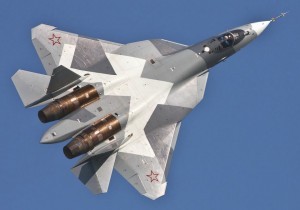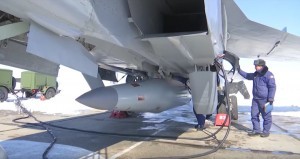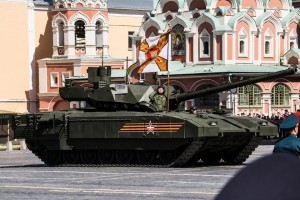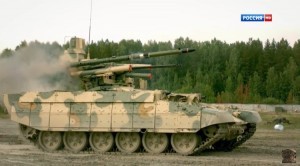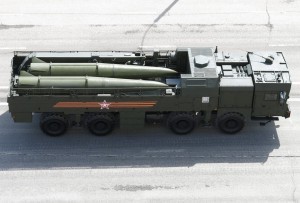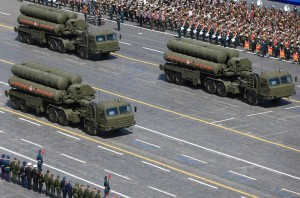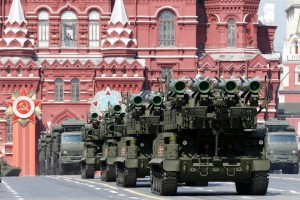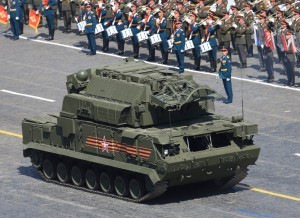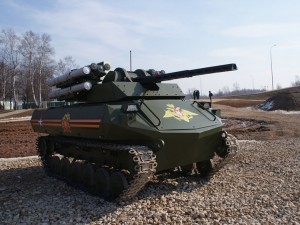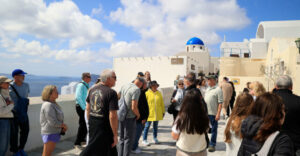Russia is gearing up for its annual Victory Day Parade on Wednesday in Moscow’s Red Square, which celebrates the capitulation of Nazi Germany in World War II.
About 12,500 Russian troops, 73 aircraft, and 120 vehicles will partake in the parade, according to Russian state-owned media.
This year’s parade will include for the first time Russia’s stealth fighter, the Su-57, as well as its new hypersonic Kh-47M2 “Kinzhal” missile, which Moscow unveiled in early March.
It will also include the YARS ballistic missile, the Armata system, the Uran-9 unmanned combat system, the S-400 missile defense system, and more.
Watch the military parade:
Here’s some of the major weaponry slated to partake in the parade:
Su-57 stealth fighter jet
The Su-57 recently became operational and was deployed to Syria in February.
But the jet is reportedly still running on AL-41F1 engines, the same engines that are on the Su-35, and is therefore still not a fifth-generation aircraft.
Kh-47M2 “Kinzhal” hypersonic missile
Russia successfully tested the Kinzhal for the first time in March, air-launching it from a MiG-31BM.
It’s reported to be nuclear capable and have a range of 1,200 miles, but some have also claimed that its capabilities have been over-hyped.
T-14 Armata tank
The T-14, which is part of Russia’s new Armata Universal Combat Platform, was unveiled in the 2015 Victory Day Parade. But it has not been mass produced yet because of budget constraints.
Initially, Moscow said it would put 2,300 T-14s into service by 2020, but has since scaled it back to 100 tanks by 2020.
Russia’s new Armata series also includes the T-15, or Terminator 3, and the self-propelled 2S35 Koalitsiya-SV.
Terminator infantry fighting vehicles
Russian state-owned media has reported that Terminator infantry fighting vehicles will partake in the parade, but it’s unclear which versions will be included.
There are currently three versions, the second of which is above. The newest, the T-15, is part of Russia’s new Armata system, but little is still known about it.
RS-24 YARS intercontinental ballistic missile
The YARS was first tested in 2007, and later entered service in 2010. It was first launched from mobile launcher vehicles, but as of 2014, it can be fired from silos.
In September 2017, it was successfully tested at a distance of more than 5,000 miles.
Iskander short-range ballistic missile system
Russia claims that the Iskander, which has a range of about 300 miles, will be “unmatched” until at least 2025.
It became operational in 2007 and has three different variants: the Iskander-M, the Tender, and the Iskander-E, which is the export version.
S-400 missile defense system
The S-400 is a fourth-generation long-range missile-defense system that became operational in 2007.
It’s capable of taking out aircraft, drones, cruise missiles, and ballistic missiles in the terminal phase. But it doesn’t have hit-to-kill technology.
Russia is also developing an S-500 missile defense system, which it claims will be delivered in 2020.
Buk-M2 surface-to-air missiles
The Buk-M2 is a medium-range missile defense system that can take out a variety of aircraft, missiles and ground targets. It can also engage 24 targets simultaneously.
Tor-M2 surface-to-air missile system
The TOR-M2 is a short-range missile defense system that entered service in 2011. It has a range of about 7.5 miles and can take out a variety of missiles and aircraft.
Uran-9 Unmanned Ground Combat Vehicle
The Uran-9, which Russia says was deployed to Syria, was designed for reconnaissance and to provide fire support for special operators.
The combat vehicle is equipped with a 2A72 30mm automatic cannon, M120 Ataka anti-tank guided missiles and a 7.62mm gun.
Korsar unmanned aerial vehicle
Впервые в рамках парада Победы по Красной площади проедет новейший российский #БПЛА самолетного типа «Корсар» https://t.co/fN3KikUMRq #Видео демонстрирует аппарат в действии. #Минобороны #ПарадПобеды #Вооружение pic.twitter.com/cWqYoZMlW1
— Минобороны России (@mod_russia) May 7, 2018
The Korsar is “a round-the-clock, all-weather drone designed for surveillance, real-time target acquisition, battle damage assessment and the delivery of light cargoes to ground forces,” according to Sputnik, adding that it can operate about 62 miles from its command center.
The parade is also slated to include the Katran unmanned helicopter.
Source: businessinsider
Ask me anything
Explore related questions
